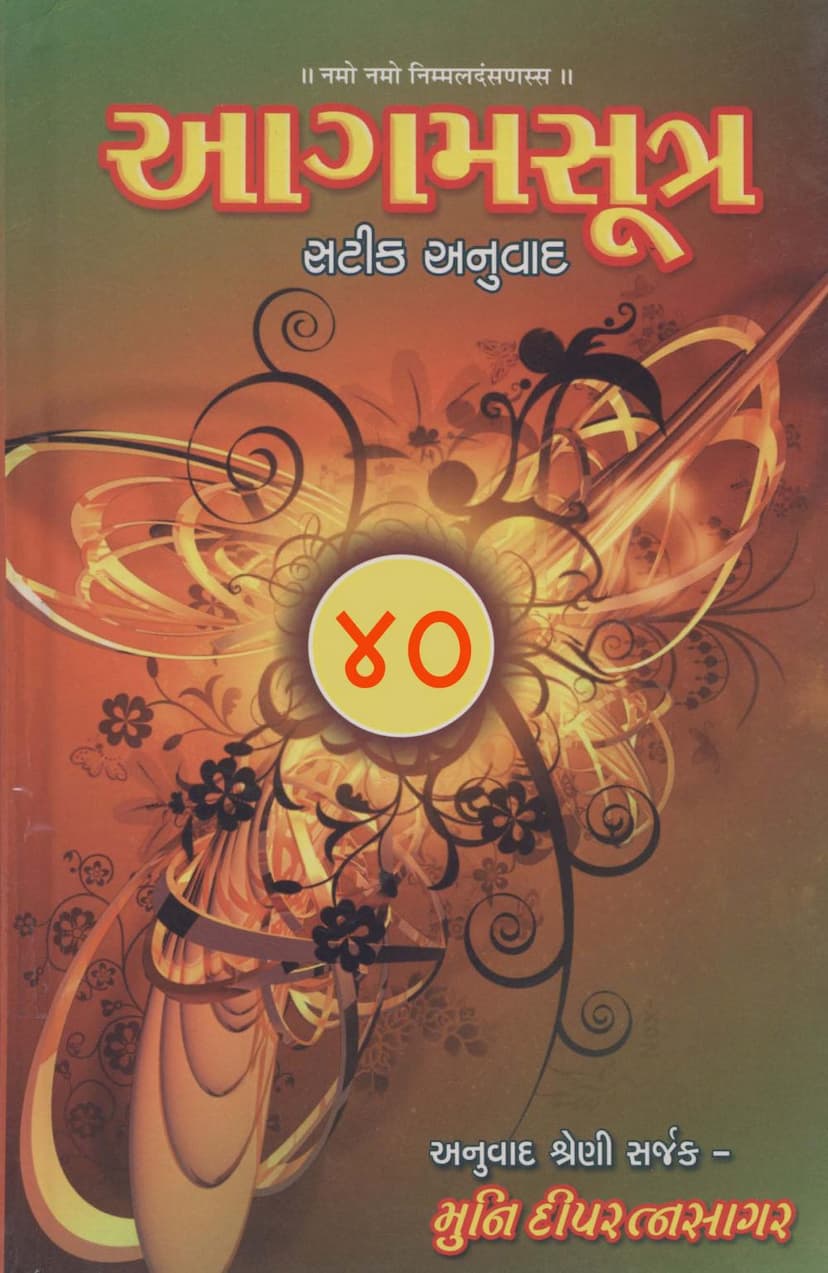Agam 44 Nandi Sutra Satik Gujarati Anuvad
Added to library: September 1, 2025

Summary
This Jain text, titled "Agam 44 Nandi Sutra Satik Gujarati Anuvad" (Agam 44 Nandi Sutra with Commentary Gujarati Translation), is a detailed exposition of the Nandi Sutra, a significant scripture in Jainism. The commentary and translation are attributed to Muni Deepratnasagar, with publishing support from Deepratnasagar.
The book is presented as part of a larger series of Agama Sutra translations, with this specific volume being the 40th installment. The catalog link provided, along with the publisher and author's details, indicate this is a formal publication aimed at making Jain scriptures accessible to a wider audience, particularly Gujarati speakers.
Key Aspects of the Text:
- Nandi Sutra as the Core Subject: The primary focus of Volume 40 is the Nandi Sutra, which is also known as "Samkrishitsutra" or "Mantrisutra" in Sanskrit or Prakrit.
- Spiritual Significance: The Nandi Sutra is primarily concerned with the concept of "Jnana" (Knowledge). It delves into the various types and sub-types of knowledge, providing a comprehensive introduction to the twelve Angas (limbs) of Jain scripture.
- Structure and Content:
- Mangala Stuti: The text begins with auspicious prayers to Lord Rishabhadeva and Lord Mahavir.
- Sangha Mahima: It glorifies the Jain Sangha (community) using various analogies, including those of a city and a chariot.
- Vandana: It includes devotional salutations to the Tirthankaras and the learned scholars (Ganudhar Bhagwant and Anuyogadhadhara Sthaviras).
- Srota and Parishad: The text elaborates on the characteristics of ideal listeners (shrota) and the assembly (parishad) through fourteen illustrative examples.
- Classification of Knowledge (Jnana): A major portion of the Nandi Sutra, and therefore this volume, focuses on the detailed explanation of the five types of knowledge (Mati, Shruta, Avadhi, Manahparyaya, and Kevala), along with their sub-classifications.
- Prakrit Language: The text notes that the Nandi Sutra is in Prakrit, and this volume provides a translation and commentary based on it.
- Commentarial Tradition: The text acknowledges the existing commentarial tradition on the Nandi Sutra, mentioning that while no Niyukti or Bhashya is recorded, commentaries like Churni, two Vrittis (including Hari Bhadra Suri's Vṛtti and Malayagiri's extensive Vritti), Vishamapada Paryaya, and Avachuri are available. The author specifically recommends reading Malayagiri's Vritti for its profound insights.
- Translation Methodology: The author mentions a slight shift in their translation methodology for this volume, moving from "Sateek Anuvad" (translation with commentary) to "Saanuvaad Vivechan" (translation with commentary and analysis). This indicates a deeper level of explanation and interpretation, where the author explains the essence and provides clarification in their own words rather than a direct translation of a single commentary.
- Author's Acknowledgment: The "Rin Sweekar" (Acknowledgment) section highlights the profound influence and inspiration from revered Acharyas like Shri Acharya Shri Chandrachandrasurishwarji M.S. and Shri Acharya Shri Devendrasurishwarji M.S., indicating a strong lineage of spiritual guidance. The financial support from various Jain Shvetambar Murtipujak Sanghs and Trusts is also prominently acknowledged, underscoring the collaborative effort involved in such large-scale religious publications.
- Publisher's Information: The publication details, including the contact address for "Aagam Aradhana Kendra" in Ahmedabad, are provided, suggesting a dedicated center for promoting Jain scriptures.
- Other Publications: The text also includes a glimpse into other publications by Muni Deepratnasagarji, covering various aspects of Jain literature such as original Agamas, Gujarati translations, commentaries, dictionaries, and works on rituals, devotion, and philosophy. This demonstrates the author's extensive contribution to Jain scholarship.
In essence, Volume 40 of the Agam Sutra series provides a scholarly and devotional rendering of the Nandi Sutra, focusing on the crucial Jain doctrine of knowledge, and is a testament to the dedication of the author and the supporting community in preserving and disseminating Jain teachings.